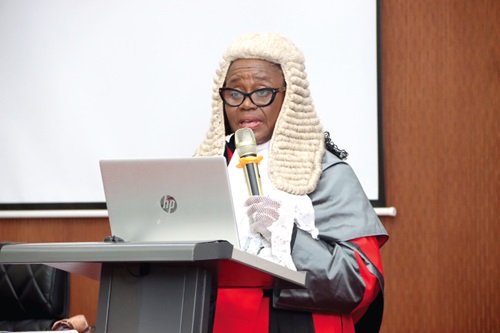The list of persons to serve as jurors in trials have been expanded to include all citizens qualified by law, including many individuals in the private sector, the Chief Justice, Justice Gertrude Sackey Torkornoo, has announced.
In addition to this, steps are being taken to further expand the pool from which jurors will be selected.
This forms part of numerous administrative reforms by the Chief Justice to ensure the expeditious adjudication of cases.
Justice Torkornoo made this known when she opened the criminal session of assizes yesterday in Accra.
Jury
The jury is made up of seven ordinary, but educated persons who, subject to the directions of the judge, decide the guilt or innocence of an accused in a case tried upon indictment.
Over the years, the justice sector has been limited to only a small pool from which jurors were chosen.
They were mainly chosen from clerical staff in the civil and/or public service institutions and in a few instances, officers from the education sector with limited revision of the pool.
The situation, the Chief Justice said, had caused the untenable problem of a particular juror being involved in several cases in different courts at the same time adding, “Some of the jurors were on jury duty for years, and in some cases, over a decade, making them almost ‘professional’, and not the lay group with fresh exposure to legalities that they were needed to be.
“With these reforms, it is our expectation that the time of citizens engaged in jury duty will be efficiently used for the expeditious disposal of cases.
“The time for change has gladly come, beginning from today’s opening of the criminal session which applies to all the regions of Ghana where trials on indictment will be conducted,” Justice Sackey Torkornoo said.
Sessions
The assizes are special court sessions to hear trials daily instead of the longer period within which they are determined.
It would be held in all regions where trials on indictment will be conducted.
The session commenced with the empanelment of a seven member jury on a case in which three persons have been charged with conspiracy to murder, and attempt to commit murder at the court presided over by Justice Ruby Aryeetey.
She outlined existing administrative directions for presiding Judges and Registrars of High Courts where trials on indictment are to be held to assist in speedy and effective trials.
Justice Aryeetey said under no circumstances should any juror be placed on the list of more than one court, thereby eliminating the possibility of any juror being involved in cases pending in more than one court.
In addition to this, the Chief Justice said trials would be conducted daily, all day, such that the courts in the criminal decision would determine one case from start to finish within a few days, before beginning the hearing of another case.
Judges, she said, were required to comply strictly with the Practice Direction (Effective Case Completion Planning Strategies) 2019 [2017-2020] 1 SCGLR 422 and the Practice Direction on Jury Trials which came into effect in May 2024.
She added that Prosecution should also be directed to file full disclosures in the cases before the jury is empanelled to avoid delays by keeping jurors on hand without actually doing any work.
“The timeous filing of full disclosures would even inform accused persons or their lawyers of the opportunity to take advantage of Plea Bargaining,” she added.
The court, she said, might also in offences not punishable by life sentences, but triable on indictment such as Rape, direct that the trial be undertaken by the Presiding Judge with the aid of assessors, instead of with a jury.
In that case, she said, the Judge would have the choice of selecting not less than three assessors, which would require a fewer number of people to assist in trials since the qualifications of jurors and assessors are the same, assessors can be drawn from the same pool.

